A Quasi -Oppositional Method for Output Tracking Control by Swarm -Based MPID Controller on AC/HVDC Interconnected Systems with Virtual Inertia Emulation
Date
2021Metadata
Show full item recordAbstract
This paper presents a comprehensive evaluation of the effect of quasi oppositional -based learning method utilization in output tracking control through a swarm-based multivariable Proportional-Integral-Derivative (SMPID) controller, which is tuned by a novel performance index based on the step response characteristics in multi-input multi-output (MIMO) system. The role of the proposed quasi oppositional based SMPID controller is to modify the tracking strategy on AC/HVDC interconnected systems while reducing the related cost function. The proposed analysis is established considering the most highly cited, well-known tested and newly expanded swarm-based optimization algorithms (SBOAs), such as Grasshopper Optimization Algorithm (GOA), Grey Wolf Optimization (GWO), Artificial Fish Swarm Algorithm (AFSA), Artificial Bee Colony (ABC) and Particle Swarm Optimization (PSO). These methods are used in the tuning process of multivariable PID (MPID) controller for output tracking control of an interconnected AC/DC system with virtual inertia emulation-based HVDC capabilities. The virtual inertia-based HVDC model, which is using a derivative technique, is attached for enhancing the system frequency dynamics with fast power injection during the contingency. The potential possibility for achieving a suitable assessment about the velocity reaction, the flexibility response, and the accuracy of the tracking process is provided by four different scenarios which are operated by step load changes as essential inputs in AC/HVDC interconnected MIMO system. Also the proposed fitness function, as deviation characteristics of the step response in MIMO transfer function in virtual inertia emulation based HVDC model, is compared with integral time absolute error (ITAE), as the standard performance index in the optimization process. The results are compared with the conventional tuned MPID (C - MPID) controller using MATLAB software. The obtained analysis emphasizes how the tuned SMPID can significantly increase the capability of tracking control on the proposed AC/HVDC interconnected model. CCBY
Collections
- Electrical Engineering [2821 items ]
Related items
Showing items related by title, author, creator and subject.
-
Finite control set model predictive control for grid-tied quasi-Z-source based multilevel inverter
Trabelsi, Mohamed; Bayhan, Sertac; Abu-Rub, Haitham; Ben-Brahim, Lazhar; Zanchetta, Pericle ( Institute of Electrical and Electronics Engineers Inc. , 2016 , Conference)In this paper, a finite control set Model Predictive Control (MPC) for grid-tie quasi-Z-Source (qZS) based multilevel inverter is proposed. The proposed Power Conditioning System (PCS) consists of a single-phase 2-cell ... -
Modeling and controller design of quasi-Z-Source inverter with battery based photovoltaic power system
Liu, Yushan; Ge, Baoming; Abu-Rub, Haitham; Iqbal, Atif; Peng, Fangzheng ( IEEE , 2012 , Article)A Photovoltaic (PV) power generation system based on quasi-Z-Source inverter (qZSI) with energy storage is presented. A dynamic small-signal model of qZSI with battery is established. Further, the battery power and current ... -
Particle swarm clustering fitness evaluation with computational centroids
Raitoharju J.; Samiee K.; Kiranyaz, Mustafa Serkan; Gabbouj M. ( Elsevier B.V. , 2017 , Article)In this paper, we propose a new way to carry out fitness evaluation in dynamic Particle Swarm Clustering (PSC) with centroid-based encoding. Generally, the PSC fitness function is selected among the clustering validity ...


